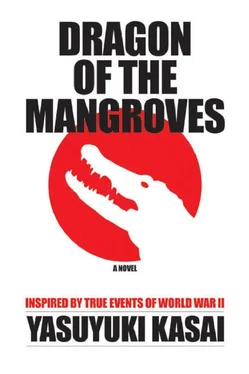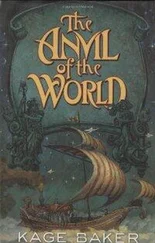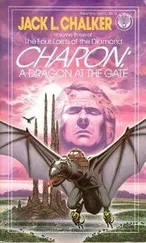The sun went down, and brilliantly crimsoned clouds drifted just above the ridgeline of Hill 604. The command was announced—at last—to plunge into Myinkhon Creek. A crowd of soldiers shouldering bamboo poles began moving out. It was not an orderly march; most of them rambled. It was rather natural, because the order to evacuate to the continent lacked any specific instruction.
Was this order issued hastily, without studying the escape route thoroughly, since First Lieutenant Kishimoto had met with an untimely death? Kasuga didn’t understand the reason. The only thing he could do now was to follow Tomita.
He was now the acting platoon commander, due to the successive deaths of Arakawa and Jinno. However, he also followed the fragmentary guidance of MG
Company almost blindly. Even though he knew quite a bit about the way to the creek because of his experience in search of First Lieutenant Kishimoto, he fell in line with the others, his face showing despair and resignation.
Various reports had come to light via word of mouth among the soldiers. The regiment HQ had reportedly dispatched a relief column, and it had already stationed itself at a village called Lamu on the opposite bank. But in addition to crossing the creek, they would have to keep walking for no less than a week to get there. Mangroves covered the continental side as well, and it would be a journey probably without food and drink.
Kasuga heard that friendly aircraft would come to attack hostile vessels blockading there just before the time of action. However, he was disappointed to hear that they consisted of only two type one hundred reconnaissances. The Allies had apparently advanced on a massive scale toward Mandalay. Now all Japanese troops were at stake. The Army Air Service had no fighters or bombers to allocate here now, so it was flying reconnaissances, hurriedly bomb-laden, instead as a last resort. But there were only two.
The garrison HQ seemed to have experienced many twists and turns up to the decision of this evacuation. The regiment commander in Taungup said they didn’t need to fight to the death and repeatedly ordered them to come back to the continent by all means. Nevertheless, most company commanders had taken a skeptical view of the operation, along with the battalion commander himself, until they eventually decided to carry out the crossing. First Lieutenant Okawa, the Sixth Company commander, opposed it vehemently, claiming the troops were very likely to be spotted if they all tried a forced crossing of the creek in the face of the enemy. Okawa said he couldn’t agree with such an irresponsible operation, and he also insisted they should build up a guerilla front there so that they could seize every opportunity to make repeated small withdrawals after gathering as many boats as possible.
But an order was an order, after all. The battalion commander had decided to carry out the creek-crossing operation. On the other hand, First Lieutenant Okawa never budged an inch from his view. So it was settled by the battalion commander that only Sixth Company would remain and back up the rest of the evacuating soldiers. Probably, he didn’t want to prosecute Okawa with disobey-ing an order.
Kasuga was delighted to hear the evacuation would proceed, but was worried about the real state of affairs. He came to think that a guerilla war in the mountains, as Okawa had said, might be a better idea. He also wondered if he could really swim that vast creek with the help of a humble bamboo pole. If they were spotted and raked by enemies on their way, what would the outcome be? Evading wouldn’t work in the middle of the creek, to say nothing of counterattacks. Even if they were fortunate enough to make it across safely, could he get to Lamu with only 3.6 liters of water in his canteen and the hollows of a bamboo?
But the foulest feeling among them all was a rather primitive fear which threw Kasuga into a blue funk.
As soon as they greeted the dawn of February 17, Tomita Squad resumed searching for any other trace of First Lieutenant Kishimoto but didn’t find anything new. How he was lost and killed ended up as an unsolved mystery.
But Kasuga believed a crocodile had gotten Kishimoto. Even the company commander himself had gone reconnoitering. Armed escorts should have accompanied him as a rule. Nevertheless, the commander had vanished into thin air when they noticed. So it was settled as a missing person case.
As an officer, Kishimoto should have had a handgun, at least. Defying the weapon, the crocodile carried him away in a flash. His disappearance had not been a human deed. Nobody could explain that puddle of blood and the amputated leg in that context.
Uncanny reptiles with tremendous power were prowling in the pitch-darkness of the mangrove, and Kasuga knew he must go there again. He was feeling desperate enough without that additional concern. It was hard to keep his sanity.
The strength of numbers helped to calm his fears a little. He was still in the Army, though it was on the run. When he entered the mangrove before, he had been accompanied only by Tomita. But this time, two-thirds of the garrison would advance there at once. Looking around, he could see many soldiers marching shoulder to shoulder. Although they didn’t have heavy firearms anymore, all armed themselves with rifles, grenades, or even light machine guns. It made him feel that he had a chance of not being chosen as a crocodile’s target.
Marching among the desolate, elongated column, Kasuga went through the
dense bamboo thicket. Many men around him carelessly hit each other with bamboo, for the long poles on their shoulders hindered their walking. A clear clang broke the sheer silence and reverberated throughout the thicket every time, followed by rebuking shouts. Kasuga thought it far from a quiet march.
Now Tomita led the MG Fifth Platoon, which was running out of members, and it got on the tail end of MG Company. When Kasuga passed through the bamboo thicket and neared the community of nipa palm, the sun had set completely. The waxing half-moon was shining far above the already-blackened ridgeline of Hill 604.
Leaves glistening in moonlight looked like bare swords, giving Kasuga ominous impressions. But they began to vanish as the odor of the sea came drifting upon them. Their platoon had stepped into the mangrove. It was difficult to walk there, even in daylight. Their march quickly stagnated, and the groans of many soldiers were heard here and there. The darkness increased considerably, as layers of branches and leaves of salt-tolerant trees covered the night sky.
Kasuga feared being left behind. Still worse, his shrapnel wound had begun throbbing with pain, and he broke out in a cold sweat. If he were to stray here, what would his fate be? It was too terrible to think. Almost desperately, he pushed his way through the trees, keeping the white sash across Tomita’s chest, looming faintly in the darkness ahead, in his sights.
He didn’t know how many hours they had been walking anymore. When he stopped to wipe the sweat from his forehead, he noticed a breeze that carried with it the hum of aircraft exhaust. Friendly reconnaissances had likely come to cover the crossing, as scheduled. A little later, the bang of a detonation could be heard up ahead. Then clatters of machine guns started reverberating. Hostile vessels had probably taken up positions on Myinkhon Creek as expected, and the recon section was challenging them to a gunfight. Kasuga could tell an aerial bomb caused the first blast.
The pitch of the aircraft drone fluctuated continuously, probably caused by the recon pilots busily manipulating their throttles. It was punctuated by the sporadic firing of machine guns, but Kasuga couldn’t tell if it was friend or foe. All of this action was unexpectedly near. All the soldiers, including Kasuga himself, had stopped. Everyone listened to the course of events in breathless suspense.
Читать дальше












